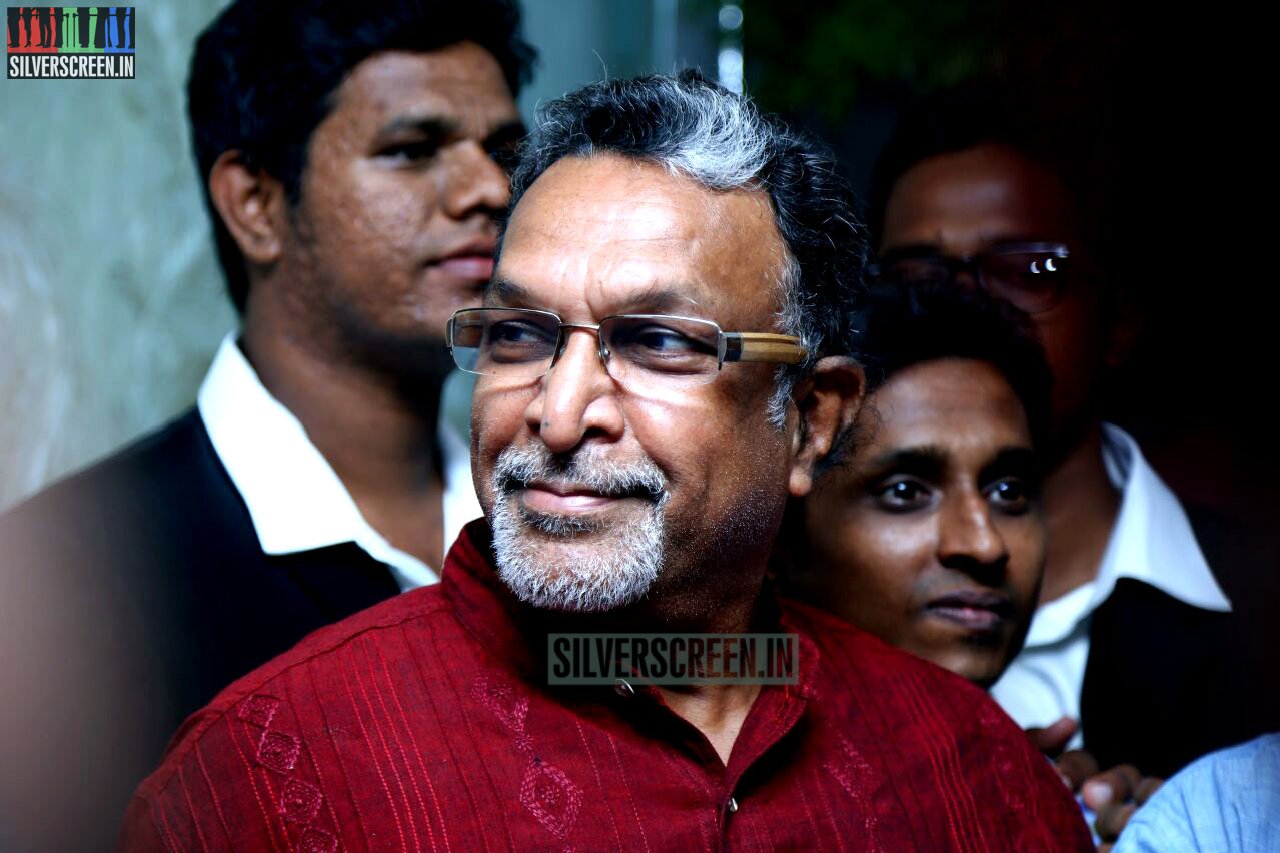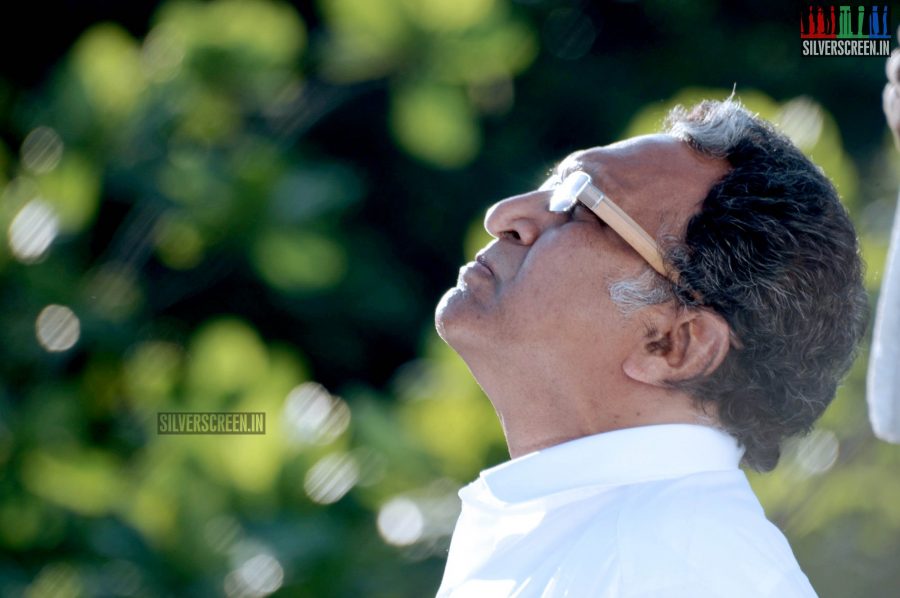
Actor Nasser on the trends in the industry, and things close to his heart.
Also, a little cinema.
I reach his home on a Sunday, to find the critically acclaimed actor, recipient of six Tamil Nadu State Film Awards, sitting amid a pile of garbage. Noticing my horrified expression, he explains: “I collect junk. If I find something interesting, I like to make recycled art out of it. This is my new hobby, it’s very interesting and this clutter drives my creativity.” He then continues sorting rubbish as if it was the most natural thing in the world.
*****
Some might call him lucky, but Nasser doesn’t believe in luck. At all: “No doctor or lawyer has ever said they are the best in the field because they are lucky. They undergo a torturous process to become who they are. So if you believe in luck then it means you don’t deserve that place.”
What’s unfortunate, he says, is that we have 100 years of cinema, but no education system to facilitate professionalization: “You see a few institutions mushrooming here and there but nobody can say how good they really are. The industry has to set certain norms for these institutions to follow. Students should go through rigorous training before they can become professionals.”
You can’t really blame the new entrants, he feels: “Nobody believes in training anymore because if you make a list of actors who are successful today, they haven’t had training. What works for one person may not work for another and we have to understand that.”
Filmmaking is the most powerful art form if used the right away, Nasser explains, “But at the back, they have all this filth floating around because nobody believes in education. Whenever you ask a successful person in the industry about how you can make a beginning, they will say you have to work hard. Frankly, what does that even mean? Where should you put all that hard work? That ought to be brought to light.”
So what are his thoughts on the industry? While on the one hand, Nasser is happy that Tamil films are being widely recognized, he also feels that nothing is right within the industry: “We are investing six thousand crores in the industry and trying to reap benefits in just two weeks. So unless we have super intelligent people working together, it is going to be very difficult. But the problem is that the majority is mediocre, so they defend mediocrity. They blame the rational and intelligent people, labelling them ‘crazy’. That cycle has to be broken.”
*****

Nasser
*****
He describes it as a curse, the way everything in Tamil Nadu is politicized. Especially films. “When a film has not even released, how can you assume that there is something offensive in it? The censor board has taken the responsibility of issuing a certificate, so how can you just assume?”
Disrupting the ‘system’ doesn’t solve anything, he feels. “When we have a system, how can you try to take law into your hands? Why do we have courtrooms and police stations, then? If you are not happy with the way it functions, by all means submit a memo, but targeting a single film is not a solution at all. However, I do understand that the censor board is running by norms which are 50 years old, that’s another issue – but targeting films in the name of caste or religion is never right.” It’s not about conservative thinking, he feels, it’s about ignorance.

Nasser at Uttama Villain Audio Launch
A major issue troubling the industry today is plagiarism, Nasser says. “That is the real problem. You have to be inspired, learn to appreciate all art forms. As a creator, one should read a lot of literature, listen to a lot of music, see a lot of art, travel, and simply experience life. Only then can you create something of your own. This exposure is what makes you different from another creator.”
Being inspired and replicating another’s work are entirely different things. “I’ve been influenced and inspired by Kurosawa. Over time, I have assimilated his thoughts. More than his images, his thoughts influence me. You cannot see a single frame in my film that resembles his. That is what you call inspiration; you are not inspired if you merely replicate his style. If you like Tarantino, learn more about his way of life, his thoughts, and his political views. Only then you will find your style.”
He adds, “A good film should be seen, felt, and understood. It should not have everything spelt out. Titanic is one of the greatest love stories. In the film, they never say, “Kadhal na enna nu theriyuma?” In fact they never use the word ‘love’ at all. But here, we have pages about how pure and divine love is. If you take a cop story, the hero has to say at least a page’s worth of fiery lines in the climax. The best films don’t really do this. Bicycle Thieves did not preach and Seven Samurai doesn’t talk about humanity. We make the highest number of films on corruption. Is corruption any less here? Then why preach it?”
*****
A creator has to be socially responsible, he says, “A creator should always have a rebellious streak in him, and a greater concern towards the society. We can have a well-taken bedroom scene over an item song, for instance. But if you don’t know the difference between the two, then you cannot call yourself socially responsible. We need to raise our voices for these issues, and not for other silly reasons.”
There is always a delicate balance he says, between good and evil, and how you portray it is everything, “A hero is always judged on how powerful the villain is. If the hero fights a street dog, he is courageous. But if he fights a tiger, he becomes much bigger. Theoretically, a villain has to be more powerful, but he cannot be glorified. There is a very thin line between these two, and sometimes people miss it.”
*****

Actor Nasser in Saivam Movie Stills
While things have changed in other industries, Naseer feels the film industry still hasn’t caught up, “If you go to Mumbai, thirty percent of a big budget film’s crew are women, and in a low-budget film, the percentage is even more. Even in Malayalam, the change is happening. But sadly, we hardly have a handful of women working in our industry.” ‘Male chauvinism’ still exists, and that’s really why women are still projected badly on screens, Nasser says.
But there are glimmers of hope. Naseer talks about one such incident, “Recently, when I stepped into director Mysskin’s office, I saw a transgendered person working there. I felt really touched and happy. This is what we want. Intelligence is everywhere and everyone should be given a chance to showcase their potential.”
******
“I’m proud to be representing UNICEF in the south,” Nasser beams. “From the list of topics they gave me, I chose to address ‘Voice Against Open Defecation and ‘Progress of Girl Children in Rural Areas’. I have been speaking to a lot of people.”
Recently, Nasser visited a girls’ school in Krishnagiri to address the issues he had taken up. “I told them what a toilet meant to me. I told them it was their right to demand a toilet and their responsibility to keep it clean. I wanted them to stop seeing toilets as an unclean and dirty environment. To me, a toilet is a meditation room. I do most of my thinking there. When we shoot outdoors, I don’t even check my room. I check the toilet first. I told them they can draw on the walls or maybe even keep a money plant. They should feel comfortable.”
“I told them I clean my own bathroom. In fact, Gandhi ji cleaned other people’s bathrooms. As Narendra Modi ji said, a bathroom is like a ‘pooja room’, so please keep it clean. Usually these government toilets are built far away, they are not maintained, they use very cheap material. I’m designing a toilet in a rural area which can be a community centre and easily accessible.”
Recommended
Our society has a big attitude problem, Nasser adds “We don’t take care of the right people. You will not die if you don’t watch my film, but can you live a day without our garbage collectors? Still we keep complaining about corporation workers. We never take care of them. Why don’t we walk up to them, tell them to wear gloves, and take necessary precautions to keep them safe? We keep talking about our love for ‘Singara Chennai’, but what do we do for the city? We use it, abuse it, and don’t take care of it. If we are more responsible, our neighbourhood can be a better place to live in.”
*****
The Nasser interview is a Silverscreen exclusive.



